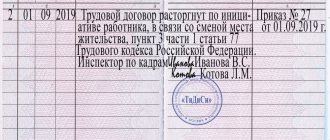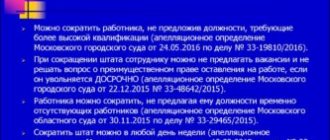Author of the article: Vladimir Danilevsky Last modified: February 2020 3797
Hiring and firing on the same day is an unusual situation even for experienced personnel officers. Such cases occur rarely, however, both the employee and the HR specialist should know the procedure. In addition, an important nuance is the correct entry into the work book. This will be discussed in detail in the article.
What laws govern the legal relationship between employer and employee?
The relationship between an employee and his employer is regulated by labor law.
Its main source is the Labor Code of the Russian Federation of December 30, 2001, 197-FZ, regulations.
On their basis, an employment contract is developed between the employer and the employee.
According to Art. 6 of the Labor Code, the procedure for dismissal is established by federal authorities.
The general grounds for dismissal are given in Art. 77 TK.
Also, the document (Articles 278, 288, 307, 312, 336) provides additional grounds on which an employee can be dismissed.
Dismissal occurs:
- at the initiative of an employee or employer;
- by agreement of the parties;
- due to circumstances (not at the will of the employer and employee);
- when does a fixed-term employment contract end?
- if the employee is to be transferred to another employer or to another position (job);
- if the employee does not agree to work due to a change in the owner of the organization;
- if the employee refused to work due to a critical change in the terms of the employment contract;
- when an employee refuses to be transferred when the employer moves to another location;
- when an employee refuses to be transferred to another job due to changes in his health status;
- when the rules for concluding an employment contract are violated, if this makes it impossible to continue working.
The first five types of dismissal are the most common.
Law
A fixed-term employment contract is signed when it is not possible to determine the exact period of work. The maximum term of such a contract is 5 years. If the contract has a longer time period, it automatically becomes indefinite.
The main legal document for termination of a fixed-term employment contract, Articles 77 and 79 of the Labor Code of the Russian Federation .
However, if the deadline has expired, this does not mean that the relationship between the employer and employee is terminated. Article 77 states that one of the parties must show initiative and desire to end the employment agreement. If no one has made an attempt, then even after five years, the manager cannot issue a dismissal order. The employee also continues to work on the same basis until he decides to find another job.
It is worth understanding that in a legal sense, oral agreements are not valid. The notice must be submitted in writing, both by the boss and by the citizen.
The concepts of termination and termination are different. In the first case, this is a temporary solution and, at the request of the parties, the contract is extended and renewed after some time. As a rule, during this period a person does not receive wages. This is stated in Article 76 of the Labor Code of the Russian Federation.
Termination, on the other hand, is used when the employee or employer unilaterally ends the relationship. Presents the other side with a fait accompli. Dismissal at will is described in Article 80 of the Labor Code of the Russian Federation, and the employer’s initiative is manifested in accordance with Article 81 of the Labor Code of the Russian Federation.
ATTENTION! Reduction from position applies only to a citizen.
Dismissal is lawful only when the following conditions are met:
- there is a legitimate reason for the employer’s actions;
- the procedure for dismissal on any grounds has been followed;
- a document has been created that confirms the dismissal (order, act, etc.).
Understanding the terms “termination” and “termination” will allow you to competently draw up a claim for dismissal under an employment contract.
Dismissal at the initiative of an employee
In most cases, an employee quits on his own initiative under clause 3, part 1, article 77 of the Labor Code of the Russian Federation.
He notifies the employer of his intention no later than two weeks in advance, unless a different period is established in the employment contract or federal legislation.
Two weeks are counted from the day after the application is submitted.
In a number of situations, the employer must carry out the dismissal within the period specified in the submitted application.
These include the following circumstances:
- impossibility of continuing to perform work duties due to retirement or enrollment in an educational institution;
- failure by the employer to fulfill obligations under the employment contract.
The advantage of this method of dismissal is that the employee has the right to withdraw his own application if another person has not been invited to take his place until this moment, and who cannot be denied employment according to the norms of current legislation.
Such an invitation is drawn up in writing.
After the expiration of the period, the applicant has the right not to go to work.
If the two-week period has expired, but the contract has not been terminated and the employee does not demand dismissal based on the previously given application, then its validity does not terminate.
This method of dismissal is beneficial to both the employer and the employee. The first one has time to either persuade the employee or find a new specialist to fill the vacant position, and the second one does not close the door on himself if he is not sure of his future.
Currently, an employee can resign not only on his own initiative, or on the initiative of the employer, but also for other reasons. Let's consider the procedure for registering termination of an employment contract when an employee transfers to an elective position.The procedure for terminating an employment contract in connection with the transfer of an employee to an elective job (position) is not specifically defined by the Labor Code of the Russian Federation, although the corresponding basis for dismissing an employee is provided for in clause 5, part 1, art. 77 Labor Code of the Russian Federation.
Therefore, when terminating an employment contract on this basis, the employer must adhere to the general procedure for terminating an employment contract.
An employee has the right to terminate an employment contract by transferring to an elective job (position), and he is obliged to notify the employer in writing two weeks before dismissal. The specified period begins the next day after the employer receives the employee’s resignation letter.
By agreement between the employee and the employer, the employment contract can be terminated even before the expiration of the notice period for dismissal. Termination of an employment contract at the initiative of an employee in the order of his transfer to an elective position is the responsibility of the employer, since participation in elections is determined by the desire of the employee, the employer is obliged to fire him, and has no right to detain such an employee at work.
The employment contract is terminated within the period specified by the employee, so that the employee can begin to perform duties at an elective job (in an elective position) on time. When an employee moves to an elective position, a new employment contract must be concluded with him.
When an employee transfers to an elective position, it is necessary to document the legality of the employee’s dismissal on the specified basis.
Before issuing a dismissal order, the employer must consider the employee's written request to transfer to elective work, which may look like the following.
When dismissal on the grounds in question, the employer must be provided with an act of election to an elective position.
Based on an act confirming the fact of election of an employee to an elective position, the employer issues an order (Form No. T-8). Here is a sample dismissal order in this situation.
Based on the dismissal order, a corresponding entry is made in the personal card (form No. T-2, approved by Resolution of the State Statistics Committee of the Russian Federation dated January 5, 2004 No. 1 “On approval of unified forms of primary accounting documentation for the accounting of labor and its payment”) and the Movement Accounting Book work books and inserts in them.
Upon termination of an employment contract in connection with the transfer of an employee to an elective job (position) to another employer in accordance with clause 6.2 of the Instructions for filling out work books, approved by Resolution of the Ministry of Labor of the Russian Federation of October 10, 2003 No. 69, the following entry is made in the work book:
After termination of the employment contract, the employer is obliged to issue the dismissed employee with a work book.
When hiring an employee to a new place of work, an entry in the employment record book is made indicating that the employee was hired in connection with the transition to an elective position.
Termination of an employment contract under clause 5, part 1, art. 77 of the Labor Code of the Russian Federation is carried out if the resigning employee does not object to this. If the employee insists on dismissal of his own free will, then the employment contract with him is terminated under clause 3, part 1, art. 77 Labor Code of the Russian Federation.
An employer who dismisses such an employee is not obliged to hire him back after the expiration of his term of service in an elective position. Upon dismissal, the employee is paid wages and compensation for unused vacation.
If an employee is hired to an elective position by transfer from another organization, then accrual of vacation pay and determination of the pay period are carried out in the general manner - starting from the first day of work at the new workplace, without taking into account length of service and wages at the previous place of work.
We note that in accordance with Part 1 of Art. 375 of the Labor Code of the Russian Federation, an employee released from work in an organization or an individual entrepreneur in connection with his election to an elective position in the elective body of a primary trade union organization is given his previous job (position) after the end of his term of office. If such work is not available, then, with the written consent of the employee, he must be provided with another equivalent job (position) with the same employer. If it is impossible to provide the specified work (position) due to the liquidation of the organization or the termination of activities by an individual entrepreneur or the absence of the corresponding work (position) in the organization, the all-Russian (interregional) trade union retains for this employee his average earnings for the period of employment, but not over 6 months, and in case of study or retraining - for up to 1 year.
If an employee refuses the proposed corresponding job (position), his average earnings for the period of employment are not retained, unless otherwise established by a decision of the all-Russian (interregional) trade union.
If an employee refuses the offered job (position), then the employment contract with him is terminated on the basis provided for in clause 7, part 1, art. 77 Labor Code of the Russian Federation.
Dismissal initiated by the employer
At the initiative of the employer, the employee is dismissed in the following cases:
- liquidation of the organization is expected;
- the owner of the organization’s property changes (the situation applies to the manager, his deputies, and the chief accountant);
- the number or staff of employees is reduced;
- the employee is not suitable for the position he occupies or is unable to fulfill the obligations assigned to him;
- the employee constantly evades fulfillment of contractual duties without good reason, if he has previously received a disciplinary sanction;
- the employee grossly failed to fulfill his job duties one time (he skipped work, showed up at work drunk, divulged a secret protected by law, committed theft of work property, violated labor safety requirements, which led to grave consequences);
- the commission by an employee who services commodity-monetary assets of actions that led to a loss of confidence in him;
- the employee committed an immoral act that was incompatible with his position, which involved edifying functions (kindergarten teacher, teacher, etc.);
- the manager, his deputies or the chief accountant made an unreasonable decision, and it led to a violation of the safety of property, its misuse, and other damage to the organization;
- the employee submitted false documents when applying for a job;
- the employee violated other terms of the employment contract;
- other cases established by current legislation.
It is worth noting that it is prohibited to dismiss an employee if he is temporarily disabled (illness, pregnancy) or is on leave, including for child care.
The exception is the upcoming liquidation of the enterprise.
Features of dismissal during liquidation of an enterprise
Dismissal upon liquidation of an enterprise is carried out in accordance with clause 1, part 1, art. 81 Labor Code of the Russian Federation.
In this case, the employee is warned about the upcoming dismissal at least two months in advance.
In addition to salary and monetary compensation for unused vacation, the employer pays him severance pay - average monthly earnings, and also retains his average monthly earnings for the period until he finds a job, but this period should not exceed 2 months.
The specified period can be increased to three months, but provided that such a person contacted the employment service within two weeks after dismissal and during this time he was unable to find a job.
Such dismissal is carried out in accordance with Part 1 of Art. 81 Labor Code of the Russian Federation.
Upon dismissal due to liquidation, no additional guarantees are paid to union members and those on vacation or sick leave.
Quite often, management, not wanting to burden themselves with financial obligations, is cunning and persuades employees to leave of their own free will.
In this case, the dismissed person will not receive any compensation other than the basic calculation or the amount specified in such an agreement.
Dismissal due to transfer to another job - step-by-step procedure
After the administration of the organization receives the employee’s application and letter of transfer, the dismissal procedure begins. It is carried out according to the general rules provided for in Art. 84.1 Labor Code of the Russian Federation.
Issuance of an order
According to Part 1 of Art. 84.1 of the Labor Code of the Russian Federation, the dismissal of an employee is carried out on the basis of an order signed by the head of the organization. The employee must be notified of the contents of the order against receipt. In addition, the administration of the organization can issue the employee a certified copy of the order. If the employee insists on this, the organization is obliged to give him such a copy.
To issue an order, the administration of an organization can use the unified form T-8 (approved by the Decree of the State Statistics Committee of the Russian Federation “On approval...” dated January 5, 2004 No. 1). It is not necessary to use this form, so the organization can develop its own version of the order.
The wording in the order must exactly correspond to subparagraph. 5 hours 1 tbsp. 77 Labor Code of the Russian Federation. That is, in the column “Grounds for dismissal” the following phrase must be indicated: “transfer at the request of the employee to work with another employer” with reference to this subparagraph.
Dismissal by transfer - entry in the work book
On the last working day, the employee must be given a completed work book with the corresponding notice of dismissal. Entries in the work book are made in accordance with paragraphs. 14 and 15 of the Rules, approved by the Decree of the Government of the Russian Federation “On Labor ...” dated April 16, 2003 No. 225. That is, the dismissal record must exactly repeat the wording of the order and the norm of the Labor Code of the Russian Federation, on the basis of which the contract is terminated. The entry is made without any abbreviations.
In addition to the work book, exactly the same entry must be made in the employee’s personal card. The employee becomes familiar with its contents by signing.
In practice, situations are possible when an employee cannot personally pick up a work book. Then the administration of the organization is obliged to send the employee a notification by mail about the need to pick up the document. After sending such a notice, the employer is relieved of responsibility for late issuance of the book.
Payments upon dismissal
On the day of dismissal, the employee must be paid in full his salary, vacation compensation and other amounts due to him.
In order to avoid disputes about the amount of payments, compensation, deductions, etc., the company’s accountant, together with a personnel employee, can draw up a calculation note in form No. T-61 (approved by Resolution of the State Statistics Committee of the Russian Federation dated January 5, 2004 No. 1).
This document consists of two parts: front and back.
On the front side of the note, information about the employee is indicated, and the number of unused vacation days is also indicated. On the back, in the appropriate columns, compensation for vacation, as well as other payments due to the employee, is calculated.
Form No. T-61 is not mandatory, so an organization can develop such a document independently. The advantage of issuing it to the employee is that the entire mechanism for calculating all amounts due upon dismissal is shown.
Dismissal for violating corporate rules
These include all the above-described violations of labor discipline.
However, proving that an employee actually violated corporate rules is not so easy.
For example, if a person is not at work for one day, this does not mean that he was absent.
He may appear in a few days with a sick leave certificate, but it is impossible to dismiss an employee who has temporarily lost his ability to work.
If a person is drunk, then to do this you need to force him to undergo a medical examination and receive an appropriate document that would confirm this fact.
It is even more difficult to prove professional unsuitability. For this purpose, certification of all company employees is assigned.
The employer must first comply with everything, and then prove that it was carried out in accordance with all the requirements of current legislation.
The reason for certification must be compelling, for example, a drop in product quality, a decrease in production volumes, consumer complaints about services or products.
The procedure for its implementation is established by labor legislation and other regulations, taking into account the opinion of the representative body of workers.
Dismissal in the event of a reduction in staff or if an employee is not suitable for the position held is carried out only if such an employee cannot, for various reasons, be transferred to another job, in the same organization or with the same individual entrepreneur.
The position is offered in the same location, unless a transfer to another within the same enterprise is provided for in the employment contract.
It is worth noting that the transfer is carried out with the written consent of the dismissed person.
Staff reduction
In general, the algorithm for dismissing an employee looks like this.
This type of layoff is worth paying close attention to, especially during a financial crisis when companies are laying off staff en masse.
- Firstly , the reduction order must indicate its date. The notice period for employees depends on it.
- Secondly , notice of dismissal for employees subject to layoffs is issued no later than two months before the future dismissal. Such notices are issued to each employee individually against signature. It also lists the positions that can be provided, as required by Art. 180 TC, if such work is available. It should be noted that vacancies are offered as they become available, up to the date of termination. If the employee agrees to another job, a transfer is issued.
- Thirdly , if there is a trade union organization, it is notified of the reduction 2 months before the start of dismissal of employees, including those who are not members of the PS, which corresponds to the definition of the Constitutional Court of January 15, 2008 No. 201-O-P. If we are talking about mass dismissal, then this period is increased to three months (for example, during the liquidation of an organization).
When dismissing employees due to downsizing, a preemptive right applies if there is a choice between several specialists.
The following shall not be dismissed on this basis:
- pregnant women and mothers with children under 3 years of age;
- traditionally retain more productive and highly qualified employees;
- if it is impossible to choose the best, then preference is given to:
- family, supporting two or more dependents;
- if the employee has no other working family members;
- employees who received work injuries or an occupational disease from this employer;
- combat disabled people;
- employees who improve their skills on-the-job at the direction of the employer.
You will probably be interested in looking at the mental map “How much should we work?”, which shows working time standards
Or HERE you will learn about the peculiarities of dismissal of a pregnant woman
Amount of compensation upon dismissal by agreement of the parties:
https://legalmap.ru/articles/tp/dismiss/kompens-uvoln-sogl-storon/
How to terminate an employment contract due to the completion of the scope of work?
Author:
Mustafanova Elmira
22.10.2018 10:34
240
Section: Dismissal
Question:
How to terminate an employment contract due to the completion of the scope of work?
Answer:
Termination of an employment contract with employees is carried out on the grounds provided for in Article 49 of the Labor Code of the Republic of Kazakhstan (hereinafter referred to as the Labor Code of the Republic of Kazakhstan).
If employees were hired for the duration of certain work and the scope of work was completed, a period or event occurred that meant the end of the employment contract, then in accordance with clause 3 of Article 51 of the Labor Code of the Republic of Kazakhstan, the expiration date of the employment contract concluded for the duration of the specific work , is the day the work is completed.
It is necessary to issue an order and bring it to the attention of employees within a 3-day working period (clause 3 of Article 61 of the Labor Code of the Republic of Kazakhstan).
If an employment contract was initially concluded with the employees for a specific period of at least one year and currently the employer does not have a scope of work, then the employment contract must be terminated in accordance with the norms of labor legislation, namely: - clause 2, clause 1 of Art. 52 of the Labor Code of the Republic of Kazakhstan - at the initiative of the employer in connection with a reduction in the number or staff of employees.
Clause 1 of Article 53 of the Labor Code of the Republic of Kazakhstan specifies the termination procedure, namely:
When terminating an employment contract on the grounds provided for in subparagraphs 1) and 2) of paragraph 1 of Article 52 of this Code, the employer is obliged to notify the employee in writing of the termination of the employment contract at least one month in advance, unless the labor or collective agreements provide for a longer notice period.
With the written consent of the employee, termination of the employment contract may be carried out before the expiration of the notice period.
It is not allowed to terminate an employment contract with employees before reaching the retirement age established by the Law of the Republic of Kazakhstan “On Pension Provision in the Republic of Kazakhstan”, who have less than two years left, on the grounds provided for in subparagraphs 2) and 4) of paragraph 1 of Article 52 of this Code, without availability a positive decision of a commission created from an equal number of representatives from the employer and employees.
The detailed procedure is located at the link.
It is necessary to carefully study before applying paragraph 3 of paragraph 1 of Article 52 of the Labor Code of the Republic of Kazakhstan - at the initiative of the employer in connection with a decrease in the volume of production, work performed and services provided, which resulted in a deterioration in the economic condition of the employer.
Clause 2 of Article 52 of the Labor Code of the Republic of Kazakhstan specifies the procedure for terminating an employment contract, namely:
When terminating an employment contract on the grounds provided for in subparagraph 3) of paragraph 1 of Article 52 of this Code, the employer is obliged to notify employees in writing of the termination of the employment contract fifteen working days in advance, unless the labor or collective agreement provides for a longer notice period.
By agreement of the parties, the notice period may be replaced by payment of wages proportional to the period not worked.
In the notice, the employer is obliged to indicate the reasons that served as the basis for termination of the employment contract.
Termination of an employment contract on this basis is possible if the following conditions are simultaneously met:
- closure of a structural unit (workshop, site);
- inability to transfer the employee to another job;
- written notification of employee representatives at least one month in advance indicating the reasons that served as the basis for termination of the employment contract (there is a direct connection between economic changes at the employer and the need to terminate the employment contract).
The detailed procedure is located at the link.
When terminating an employment contract on these grounds, it is necessary to take into account the restrictions in Article 54 of the Labor Code of the Republic of Kazakhstan, namely:
Termination of an employment contract at the initiative of the employer is not allowed during the period of temporary disability and the employee is on vacation, except for the cases provided for in subparagraphs 1), 18), 20) and 23) of paragraph 1 of Article 52 of this Code.
Termination of an employment contract at the initiative of the employer on the grounds provided for in subparagraphs 2) and 3) of paragraph 1 of Article 52 of this Code is not permitted with pregnant women who have provided the employer with a pregnancy certificate, women with children under the age of three, single mothers raising a child under the age of fourteen (disabled child up to eighteen years), other persons raising this category of children without a mother.
Article 131 of the Labor Code of the Republic of Kazakhstan provides for compensation payments, which are made by the employer in the following cases:
The employer makes compensation payments in connection with loss of work in the amount of the average monthly salary in the following cases:
- upon termination of an employment contract at the initiative of the employer in the event of liquidation of the employer - a legal entity or termination of the activities of the employer - an individual;
- upon termination of an employment contract at the initiative of the employer in the event of a reduction in the number or staff of employees;
- upon termination of an employment contract at the initiative of the employee in the event of failure by the employer to fulfill the terms of the employment contract.
The employer makes compensation payments in connection with the loss of work upon termination of the employment contract at the initiative of the employer in the event of a decrease in the volume of production, work performed and services provided, resulting in a deterioration in the economic condition of the employer, in the amount of the average salary for two months.
An employment contract, collective agreement or employer act may provide for a higher amount of compensation payment in connection with the loss of a job.
In accordance with the norms of Article 97 of the Labor Code of the Republic of Kazakhstan, only the employee is the initiator of going on leave without pay.
An employer does not have the right to send employees on leave without pay.
If the organization does not have a volume of work, then it should be considered as a simple one - a temporary suspension of work for reasons of an economic, technological, organizational, other production or natural nature (clause 10, clause 1, article 1 of the Labor Code of the Republic of Kazakhstan).
The procedure for paying for downtime is regulated by Article 112 of the Labor Code of the Republic of Kazakhstan, namely:
- The procedure for registering downtime and the terms of payment for downtime for reasons beyond the control of the employer and employee are determined by labor and collective agreements and are established in an amount not lower than the minimum wage; if the employer is at fault - in an amount of at least fifty percent of the employee’s average salary.
- Downtime caused by the employee is not subject to payment.
Those. it is necessary to determine the reason for the downtime, issue an employer act (order) and pay in accordance with the reason for which the downtime occurred and guided by Article 112 of the Labor Code of the Republic of Kazakhstan.
Article 42 of the Labor Code of the Republic of Kazakhstan indicates:
- In case of downtime, the employer has the right to transfer the employee without his consent for the entire period of downtime to another job that is not contraindicated for health reasons.
- When temporarily transferred to another job in case of downtime, the employee is paid according to the work performed.
Dear users! The information in the response complies with the legislation of the Republic of Kazakhstan in force at the time (date) of publication.
You may also be interested in:
- How can I terminate an employment contract with an employee on maternity leave and how soon can this be done?
Author:
Kuur Olesya
23.05.2020 08:41
18
Section: Dismissal
Answer:
According to paragraph 2 of Article 51 of the Labor Code of the Republic of Kazakhstan (hereinafter referred to as the Code), if on the day of expiration of an employment contract concluded for a specific period of at least one year, a pregnant woman submits a certificate of pregnancy for twelve weeks or more, and also an employee who has a child under the age of three, who has adopted a child and wishes to use his right to leave without pay to care for
- Is unused paid annual leave paid if the employee was dismissed on the basis of Article 52, paragraph 9, of the employee being at work in a state of alcoholic, narcotic, psychotropic, or toxic intoxication (their analogues)?
Author:
Shlyakhova Natalya
28.04.2020 08:41
64
Section: Dismissal Guarantees and compensation payments
Answer:
According to paragraph 2 of Article 96 of the Labor Code of the Republic of Kazakhstan, upon termination of an employment contract, an employee who did not use or did not use fully paid annual leave (annual labor leave)
- The production facility is heated from its own boiler room. In this regard, in November, stokers were hired under a regular employment contract with work schedules every other day. Now, due to the end of the heating season, we need to terminate the TD data. How can we do this?
Author:
Zinovieva Alina
24.04.2020 07:59
52
Section: Dismissal Termination of employment relations at the initiative of the employer Termination of employment relations at the initiative of the employee
Answer:
Article 52 of the Labor Code of the Republic of Kazakhstan provides for the grounds for termination of labor relations at the initiative of the employer.
- The employee leaves the organization on April 20, 2020. Previously, from 04/06/20 to 04/19/20, he was on leave without pay due to the introduction of quarantine in the city. When calculating compensation upon dismissal, are days without pay during the quarantine period included in the calculation of vacation days?
Author:
Shlyakhova Natalya
23.04.2020 08:36
167
Section: Dismissal Guarantees and compensation payments
Answer:
In accordance with paragraphs 1 and 2 of Article 97 of the Labor Code, by agreement of the parties to the employment contract, based on the employee’s application, he may be granted leave without pay.
- The employee has been working in the organization since 03/01/2019. In November 2020 took annual paid leave with a duration of 14 calendar days. From 01.12. 2020 until 03/31/2020 was absent from work due to illness (data provided). For the entire period the employee was on sick leave from December 1, 2019. until 03/31/2020 Is compensation calculated for unused days of vacation upon dismissal?
Author:
Shlyakhova Natalya
23.04.2020 08:19
69
Section: Dismissal Guarantees and compensation payments
Answer:
In accordance with Article 91 of the Labor Code of the Republic of Kazakhstan, the length of service when granting paid annual leave includes:
- The employee got a job in March of this year under ITD, but did not work a single day. In April he is fired and the order must pay 1 calendar day of compensation for payment upon dismissal. Is accounting required to accrue compensation for 1 day if the employee has zero payroll?
Author:
Zhomartova Nazira
15.04.2020 08:49
70
Section: Dismissal Rationing and remuneration
Question:
The employee got a job in March of this year under ITD, but did not work a single day. In April he is fired and the order must pay 1 calendar day of compensation for payment upon dismissal. Is accounting required to accrue compensation for 1 day if the employee has zero payroll?
- According to paragraph 5. Article 115 of the Labor Code of the Republic of Kazakhstan, when dismissing employees only with their consent, the cost of issued personal protective equipment (working clothing) is withheld according to the time of wearing and the period of wear. Are the employer's actions legal?
Author:
Dauletkyzy Aigul
21.02.2020 09:51
75
Section: Dismissal
Answer:
According to paragraph 4 of paragraph 2 of Article 182 of the Labor Code of the Republic of Kazakhstan (hereinafter referred to as the Labor Code of the Republic of Kazakhstan), the employer in the field of labor safety and health is obliged to create the necessary sanitary and hygienic conditions for workers, ensure the issuance and repair of special clothing and footwear for workers, supplying them with funds
- What is the procedure for dismissing an accountant?
Author:
Iskhakova Arindia
12.02.2020 08:53
186
Section: Dismissal Termination of employment relations at the initiative of the employee
Answer:
According to Art. 56 of the Labor Code of the Republic of Kazakhstan, an employee has the right, on his own initiative, to terminate an employment contract by notifying the employer in writing at least one month in advance, except for the cases provided for in paragraph 3 of this article. The employment contract may establish a longer period for the employee to notify the employer of termination of the employment contract.
- The employee died a month ago, but the relatives never provided a death certificate. What to do in such a situation?
Author:
Kuur Olesya
15.07.2019 06:54
454
Section: Dismissal All questions on Labor relations
Answer:
According to the Labor Code of the Republic of Kazakhstan (hereinafter referred to as the Code), an employment contract is subject to termination in the event of the death of an employee (clause 3, clause 1, article 57), but until the employer has a death certificate or a court decision in his hands, dismiss the employee under this he cannot, even if he knows for sure that
- How is an order to terminate an employment contract due to the death of an employee drawn up?
Author:
Mustafanova Elmira
08.07.2019 06:37
563
Section: Dismissal
Answer:
Article 57 of the Labor Code of the Republic of Kazakhstan dated November 23, 2015 No. 414-V (as amended and supplemented as of January 1, 2019) (hereinafter referred to as the Labor Code of the Republic of Kazakhstan) provides for the grounds for termination of an employment contract for circumstances beyond the will of parties, and the employment contract may be terminated due to circumstances beyond the control of the parties, specified in clause 3) clause 1:
Dismissal by agreement of the parties
This type of dismissal is considered the most peaceful.
In fact, the law allows bilateral termination of an employment contract with the consent of both parties.
The initiative can belong to both the employee and the employer.
In this case, an agreement to terminate the contract is usually drawn up, which is drawn up in any form.
Such an agreement specifies the terms of dismissal and its conditions.
Some companies follow a simplified procedure: the manager simply imposes a resolution on the employee’s statement, in which he indicates the reason - an agreement of the parties.
In general, dismissal by agreement of the parties is interesting for both the employer and the employee:
- the employee can count on compensation, that is, additional payments upon termination of the contract, the amount of which is not limited in any way. However, such payments must be recorded, otherwise the calculation will be made in accordance with the requirements of the Labor Code of the Russian Federation - the amounts will be minimal;
- the employer has a guarantee that the former employee will not change his mind, as happens when dismissing at his own request: in order to cancel the agreement, the good will of both parties is required. In addition, he can fire an employee, even if he is on vacation or sick leave.
Dismissal procedure
The procedure for terminating an employment relationship in connection with the appointment of a person to a selective position is carried out according to the standard procedure:
- the employee notifies the head of the organization in advance of his intention to leave the organization. This must be done with a written statement indicating the reasons for leaving. The document is drawn up in free form or using the organization’s letterhead;
It is important to know! The application must be accompanied by an act that confirms the fact of the person’s election to an elective position.
- After reading the document, the employer must issue an order to terminate the employment relationship. The document must be familiarized with the employee against signature;
- The responsible person prepares all necessary documents.
- full payment is made to the employee.
In some cases, the employer is obliged to send written notice of termination of cooperation with a person to the military registration and enlistment office, if he is liable for military service, and to bailiffs, in case of arrears, for example, for alimony.
Read on the topic: Is the employer obliged to issue a medical book upon dismissal?
Read on the topic: Dismissal at your own request in one day
Dismissal due to circumstances beyond the control of the parties
Here, dismissal is regulated by Art. 83 Labor Code of the Russian Federation. This article is rarely used.
The grounds for such dismissal may be:
- conscription for military or alternative service;
- reinstatement of an employee who previously occupied this position based on a court decision or labor inspectorate;
- failure to be elected to office;
- conviction to punishment in accordance with a court decision;
- a person’s inability to work according to a medical report;
- death of an employer (IP) or employee, recognition of one of them as missing;
- emergency circumstances recognized by the decision of the Government of the Russian Federation, a state authority, a subject of the Russian Federation (war, natural disaster, accident, etc.);
- disqualification or administrative punishment that excludes the possibility of performing duties in accordance with the employment contract;
- expiration, suspension for two or more months, deprivation of an employee’s license, the right to drive a vehicle and other special rights;
- termination of access to state secrets, if necessary;
- excess share of foreign workers;
- changes in labor legislation.
Such dismissal sometimes requires a special procedure to be followed when another position must be offered in the same enterprise in the same area.
When dismissing an employee under this article, there is no preliminary deadline, that is, dismissal can occur on the same day.
But the employee must receive written notice of dismissal, which can be given even two hours before the event.
How to protect yourself from wrongful dismissal?
Quite often, a fired person believes that he was deprived of his job unfairly.
According to statistics, 50% of workers face such a violation.
One of the most difficult disputes is one that involves a statement of voluntary resignation, when the employee claims that he wrote it under pressure.
Here it is rarely possible to prove that rights were actually violated.
If an employee believes that he was fired illegally or with violations, then he can always apply to protect his rights:
- to the labor inspectorate at the place of work - complaints are considered within 30 days;
- to the court at the location of the organization - complaints are considered within 30 days as required by law, in fact this period is longer;
- to the prosecutor's office.
Dismissal procedure
What’s interesting is that the principle of leaving an organization is the same for fixed-term and open-ended types of contracts. So, what is the procedure for dismissal at the request of an employee?
- A written application is submitted upon completion of work addressed to the manager or organization. The deadline is no later than two weeks before termination of official duties. The time for citizens employed in seasonal work is reduced to three days. If desired, the employee can notify his immediate supervisor for a longer period of time (a month, etc.).
- The manager writes a dismissal order using the unified form No. T-8 . It indicates the reason, term and date of entry into force. The employee must be familiarized with the order. He certifies the document with his signature.
- A full payment is made for actual time worked. The employee is also paid compensation for missed vacation, even if he worked only 2 weeks. Of course, you shouldn’t count on large sums in this case.
- An entry is made in the work book. Dismissal, as a rule, if there were no emergency situations, occurs under paragraph 2 of part one of Article 77 of the Labor Code of the Russian Federation.
The general procedure is as follows. It may vary in detail and include intermediate points. Let us pay close attention to the important nuances of dismissal due to termination of an employment contract. Understanding them will allow you to correctly terminate the working relationship and, if desired, return.
A sample notice of termination of a fixed-term employment contract can be viewed and downloaded below:
What types of dismissal are the most profitable?
The most convenient from the point of view of material benefits is dismissal by agreement of the parties, when, roughly speaking, you can bargain with the employer for the so-called payout. Moreover, it is beneficial for both the employer and the employee.
The most advantageous from the point of view of freedom of action is dismissal at will, when there are two weeks left for maneuvers and making a final decision.
In the case where the employee is under pressure, the statement “at his own request” can be called one of the most disadvantageous, since it practically makes it impossible to challenge the dismissal.










